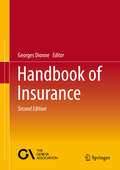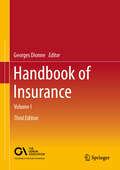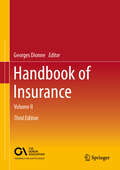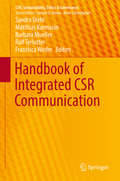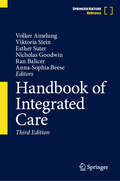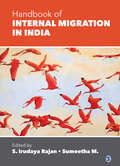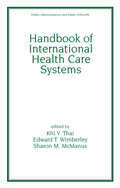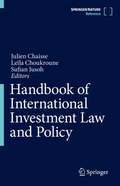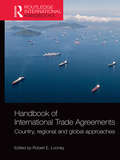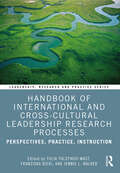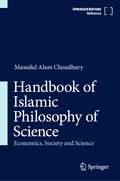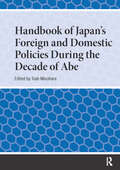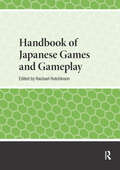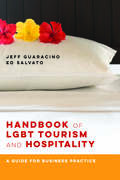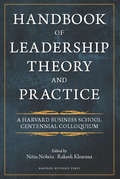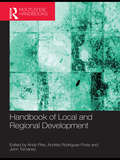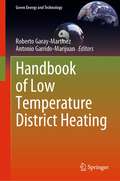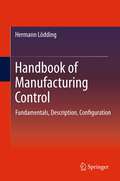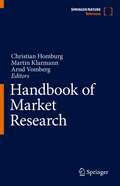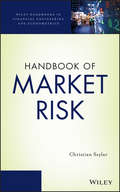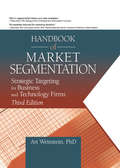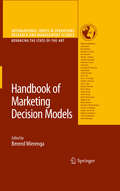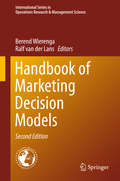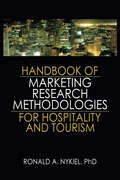- Table View
- List View
Handbook of Insurance
by Georges DionneThis new edition of the Handbook of Insurance reviews the last forty years of research developments in insurance and its related fields. A single reference source for professors, researchers, graduate students, regulators, consultants and practitioners, the book starts with the history and foundations of risk and insurance theory, followed by a review of prevention and precaution, asymmetric information, risk management, insurance pricing, new financial innovations, reinsurance, corporate governance, capital allocation, securitization, systemic risk, insurance regulation, the industrial organization of insurance markets and other insurance market applications. It ends with health insurance, longevity risk, long-term care insurance, life insurance financial products and social insurance. This second version of the Handbook contains 15 new chapters. Each of the 37 chapters has been written by leading authorities in risk and insurance research, all contributions have been peer reviewed, and each chapter can be read independently of the others.
Handbook of Insurance: Volume I
by Georges DionneThe Handbook of Insurance reviews the last fifty years of research developments in insurance economics and its related fields. A single reference source for professors, researchers, graduate students, regulators, consultants, and practitioners, the book starts with the history and foundations of risk and insurance theory, followed by a review of prevention and precaution, asymmetric information, insurance fraud, risk management, insurance pricing, new financial innovations, reinsurance, corporate governance, capital allocation, securitization, systemic risk, insurance regulation, the industrial organization of insurance markets, and other insurance market applications. The new edition covers many topics that have risen in importance since the 2nd edition, such as climate risk, pandemic risk, insurtech, digital insurance, cyber risk, behavioral economics, Solvency II, corporate governance, enterprise risk management, and machine learning. This edition of the Handbook contains 17 new chapters. Each of the chapters is written by leading international authorities in risk and insurance research. All contributions are peer reviewed, and each chapter can be read independently of the others. It is a tour de force to provide to the insurance industry and its stakeholders a structured, complete, intelligent and critical synthesis of insurance economics in the twenty-first century. This is what you have in your hands. This third edition of the Handbook of Insurance should be the bible to anyone who wants to have a deep understanding of the complex challenges faced by insurance and reinsurance markets to create the large social value of risk sharing and risk diversification. Christian Gollier, Director of the Toulouse School of Economics This collective work not only offers a remarkable synthesis of cutting-edge research in insurance economics but also provides a rare resource, both comprehensive and authoritative, for professionals seeking a deeper understanding of insurance industry fundamentals and emerging trends. The content of the Handbook reflects the richness and dynamics of the field and underlines the many facets involved in better understanding how insurance works and contributes to society. Kai-Uwe Schanz, Deputy Managing Director, Head of Research & Foresight, The Geneva Association
Handbook of Insurance: Volume II
by Georges DionneThe Handbook of Insurance reviews the last fifty years of research developments in insurance economics and its related fields. A single reference source for professors, researchers, graduate students, regulators, consultants, and practitioners, the book starts with the history and foundations of risk and insurance theory, followed by a review of prevention and precaution, asymmetric information, insurance fraud, risk management, insurance pricing, new financial innovations, reinsurance, corporate governance, capital allocation, securitization, systemic risk, insurance regulation, the industrial organization of insurance markets, and other insurance market applications. The new edition covers many topics that have risen in importance since the 2nd edition, such as climate risk, pandemic risk, insurtech, digital insurance, cyber risk, behavioral economics, Solvency II, corporate governance, enterprise risk management, and machine learning. This edition of the Handbook contains 20 new chapters. Each of the chapters is written by leading international authorities in risk and insurance research. All contributions are peer reviewed, and each chapter can be read independently of the others. It is a tour de force to provide to the insurance industry and its stakeholders a structured, complete, intelligent and critical synthesis of insurance economics in the twenty-first century. This is what you have in your hands. This third edition of the Handbook of Insurance should be the bible to anyone who wants to have a deep understanding of the complex challenges faced by insurance and reinsurance markets to create the large social value of risk sharing and risk diversification. Christian Gollier, Director of the Toulouse School of Economics This collective work not only offers a remarkable synthesis of cutting-edge research in insurance economics but also provides a rare resource, both comprehensive and authoritative, for professionals seeking a deeper understanding of insurance industry fundamentals and emerging trends. The content of the Handbook reflects the richness and dynamics of the field and underlines the many facets involved in better understanding how insurance works and contributes to society. Jad Ariss, Managing director, The Geneva Association
Handbook of Integrated CSR Communication
by Sandra Diehl Matthias Karmasin Barbara Mueller Ralf Terlutter Franzisca WederThis handbook pursues an integrated communication approach. Drawing on the various fields of organizational communication and their relevance for CSR, it addresses innovative topics such as big data, social media, and the convergence of communication channels, as well as the roles they play in a successfully integrated CSR communication program. Further aspects covered include the analysis of sector-specific, cross-cultural, and ethical challenges related to the effective communication of CSR. This handbook is unique in its consistent focus on integrated communication. It is of interest not only for the scientific discourse, but will also benefit those corporations that not only seek to operate in a socially responsible manner, but also to communicate their efforts to their various stakeholders. Besides its significant value for researchers and professionals, the book can also be used as a reference for undergraduate and graduate students interested in successful CSR communication.
Handbook of Integrated Care
by Volker Amelung Viktoria Stein Nicholas Goodwin Ran Balicer Esther Suter Anna-Sophia BeeseThis handbook shares profound insights into the main principles and concepts of integrated care. It offers a multi-disciplinary perspective with a focus on patient orientation, efficiency, and quality by applying widely recognized management approaches to the field of healthcare. The handbook also highlights international best practices and shows how integrated care can work in various health systems. In the majority of health systems around the world, the delivery of healthcare and social care is characterised by fragmentation and complexity. Consequently, much of the recent international discussion in the fields of health policy and health management has focused on the topic of integrated care. &“Integrated&” acknowledges the complexity of patients&’ needs and aims to meet them by taking into account both health and social care aspects. Changing and improving processes in a coordinated way is at the heart of this approach. The third edition offers new chapters on people-centredness, complexity theories and evaluation methods, additional management tools and a wealth of experiences from different countries and localities. It is essential reading both for health policymakers seeking inspiration for legislation and for practitioners involved in the management of public health services who want to learn from good practice.
Handbook of Internal Migration in India
by © S. Irudaya Rajan and Sumeetha M.Handbook of Internal Migration in India is an inter-disciplinary, multi-faceted and thought-provoking book on internal migrants and their dynamics among the states in India. The first of its kind, this handbook provides novel information on processes, trends, determinants, differentials and dynamics of internal migration and its inter-linkages with individuals, families, economy and society. Most of the chapters have been written by scholars of repute who have spent their lifetime working on migration and the factors associated with it. This handbook is an attempt to address the lacunae in internal migration studies using both big data, such as Indian censuses, National Sample Surveys, India Human Development Surveys and Kerala Migration Surveys, and micro-level data collected by enthusiastic researchers in most parts of India to explore the unknown facets of internal migration. This book employs interdisciplinary and mixed methods to examine issues such as climate change, gender, urbanization, caste/tribe, religion, politics and emergence of migration policies. It addresses the crucial question as to why temporary and short-term migration continues to be an important livelihood strategy for millions of migrants thereby having an everlasting impact on the sociopolitical and economic structure of the country.
Handbook of International Health Care Systems
by Khi V. Thai Edward T. Wimberley Sharon M. McManus"Presents a comprehensive overview of the current state of health care and availability worldwide. Focuses on the appraoch to the provision of quality, cost-effective health care systems by ""established"" and developing member countries of the Organization for Economic Cooperation and Development (OECD). Compares health care financing across all O
Handbook of International Investment Law and Policy
by Julien Chaisse Leïla Choukroune Sufian JusohThe Handbook of International Investment Law and Policy is a one-stop reference source. This Handbook covers the main conceptual questions in a logical, scholarly yet easy to comprehend manner. It is based on a truly global vision insisting particularly on Global South related issues and developments. In this respect, the Handbook of International Investment Law and Policy provides an excellent modern treatment of international investment law which is one of the fastest growing areas of international economic law. Professor Julien Chaisse, Professor Leïla Choukroune, and Professor Sufian Jusoh are the editors-in-chief of the Handbook of International Investment Law and Policy, a 1,500-page reference book, which is anticipated becoming one of the most influenced reference books in the international economic law areas. This Handbook is a highly comprehensive set of four volumes of original materials designed to cover all facets of international investment law and policy. The chapters, written by world-leading experts, explore key ideas and debates in relation to: international investment substantive law (Volume I), Investor-state dispute settlement (Volume II); interaction between international investment law and other fields of international law (Volume III); and, the new trends and challenges for international investment law (Volume IV). The Handbook will feature more than 80 contributions from leading experts (academics, lawyers, government officials), including Vivienne Bath, M. Sornarajah, Mélida Hodgson, Rahul Donde, Roberto Echandi, Andrew Mitchell, Ernst-Ulrich Petersmann, Christina L. Beharry, Krista Nadakavukaren Schefer, Leon Trakman, Prabhash Ranjan, Emmanuel Jacomy, Mariel Dimsey, Stavros Brekoulakis, Romesh Weeramantry, Nathalie Bernasconi-Osterwalder, David Collins, Damilola S. Olawuyi, Katia Fach Gomez, Jaemin Lee, Alejandro Carballo-Leyda, Patrick W. Pearsall, Mark Feldman, Surya Deva, Luke Nottage, Rafael Leal-Arcas, James Nedumpara, Rodrigo Polanco, etc. This Handbook will be an essential reference tool for students and scholars of international economic law. Policy makers and researchers alike will find the Handbook of International Investment Law and Policy useful for years to come.
Handbook of International Trade Agreements: Country, regional and global approaches (Routledge International Handbooks)
by Robert E. LooneyInternational trade has, for decades, been central to economic growth and improved standards of living for nations and regions worldwide. For most of the advanced countries, trade has raised standards of living, while for most emerging economies, growth did not begin until their integration into the global economy. The economic explanation is simple: international trade facilitates specialization, increased efficiency and improved productivity to an extent impossible in closed economies. However, recent years have seen a significant slowdown in global trade, and the global system has increasingly come under attack from politicians on the right and on the left. The benefits of open markets, the continuation of international co-operation, and the usefulness of multilateral institutions such as the World Trade Organization (WTO), the International Monetary Fund and the World Bank have all been called into question. While globalization has had a broadly positive effect on overall global welfare, it has also been perceived by the public as damaging communities and social classes in the industrialized world, spawning, for example, Brexit and the US exit from the Trans-Pacific Partnership. The purpose of this volume is to examine international and regional preferential trade agreements (PTAs), which offer like-minded countries a possible means to continue receiving the benefits of economic liberalization and expanded trade. What are the strengths and weaknesses of such agreements, and how can they sustain growth and prosperity for their members in an ever-challenging global economic environment? The Handbook is divided into two parts. The first, Global Themes, offers analysis of issues including the WTO, trade agreements and economic development, intellectual property rights, security and environmental issues, and PTAs and developing countries. The second part examines regional and country-specific agreements and issues, including NAFTA, CARICOM, CETA, the Pacific Alliance, the European Union, EFTA, ECOWAS, SADC, TTIP, RCEP and the TPP (now the CPTPP), as well as the policies of countries such as Japan and Australia.
Handbook of International and Cross-Cultural Leadership Research Processes: Perspectives, Practice, Instruction (ISSN)
by Yulia Tolstikov-MastAn invaluable contribution to the area of leadership studies, the Handbook of International and Cross-Cultural Leadership Research Processes: Perspectives, Practice, Instruction brings together renowned authors with diverse cultural, academic, and practitioner backgrounds to provide a comprehensive overview and analysis of all stages of the research process.The handbook centers around authors’ international research reflections and experiences, with chapters that reflect and analyze various research experiences in order to help readers learn about the integrity of each stage of the international leadership research process with examples and discussions. Part I introduces philosophical traditions of the leadership field and discusses how established leadership and followership theories and approaches sometimes fail to capture leadership realities of different cultures and societies. Part II focuses on methodological challenges and opportunities. Scholars share insights on their research practices in different stages of international and cross-cultural studies. Part III is forward-looking in preparing readers to respond to complex realities of the leadership field: teaching, learning, publishing, and applying international and cross-cultural leadership research standards with integrity. The unifying thread amongst all the chapters is a shared intent to build knowledge of diverse and evolving leadership practices and phenomena across cultures and societies.The handbook is an excellent resource for a broad audience including scholars across disciplines and fields, such as psychology, management, history, cognitive science, economics, anthropology, sociology, and medicine, as well as educators, consultants, and graduate and doctoral students who are interested in understanding authentic leadership practices outside of the traditional Western paradigm.
Handbook of International and Cross-Cultural Leadership Research Processes: Perspectives, Practice, Instruction (Leadership: Research and Practice)
by Yulia Tolstikov-MastAn invaluable contribution to the area of leadership studies, the Handbook of International and Cross-Cultural Leadership Research Processes: Perspectives, Practice, Instruction brings together renowned authors with diverse cultural, academic, and practitioner backgrounds to provide a comprehensive overview and analysis of all stages of the research process. The handbook centers around authors’ international research reflections and experiences, with chapters that reflect and analyze various research experiences in order to help readers learn about the integrity of each stage of the international leadership research process with examples and discussions. Part I introduces philosophical traditions of the leadership field and discusses how established leadership and followership theories and approaches sometimes fail to capture leadership realities of different cultures and societies. Part II focuses on methodological challenges and opportunities. Scholars share insights on their research practices in different stages of international and cross-cultural studies. Part III is forward-looking in preparing readers to respond to complex realities of the leadership field: teaching, learning, publishing, and applying international and cross-cultural leadership research standards with integrity. The unifying thread amongst all the chapters is a shared intent to build knowledge of diverse and evolving leadership practices and phenomena across cultures and societies. The handbook is an excellent resource for a broad audience including scholars across disciplines and fields, such as psychology, management, history, cognitive science, economics, anthropology, sociology, and medicine, as well as educators, consultants, and graduate and doctoral students who are interested in understanding authentic leadership practices outside of the traditional Western paradigm.
Handbook of Islamic Philosophy of Science: Economics, Society and Science
by Masudul Alam ChoudhuryThis handbook provides a comprehensive overview of Islamic ethical issues within a wide spectrum of philosophy of science topics, examining the development of the model of moral inclusiveness in economics, science and society from ontological, epistemological and analytical perspectives. This paradigm takes the view that ethics is systemically endogenous, and can be studied by the most rigorous scientific analysis pertaining to diverse issues and problems of ethicality in socio-scientific inquiry. This handbook takes a sweeping transdisciplinary approach that is deeply phenomenological, to the nature and logic of scientific inquiry of, and in, the Qur’an. Such an approach invokes the episteme of the unity of knowledge in the socio-scientific systemic sense. The volumes' respective sections focus on the nature, logic, and role that ethics plays in formulating new vistas of alternative epistemic futures in Islamic economics, finance, and the social sciences. The ideas presented are situated within the broader context of the post-modernist, post-pandemic, and the post-Covid-19 epoch, while being aimed at conceptualising a distinctive new outlook of transdisciplinary intellection in Islamic philosophy. The content is rigorously conceptual, qualitative, quantitative, and applied. Covering a diversity of subject areas from philosophy of science, to economics and in socio-scientific context within the realm of Islamic philosophy, this forms a key text for scholars in these respective arenas, led by pioneering scholarship in Islamic studies.
Handbook of Japan's Foreign and Domestic Policies During the Decade of Abe (Handbooks on Japanese Studies)
by Tosh MinoharaNo Japanese leader has dominated Japan’s recent political landscape more than the late Abe Shinzo. With the this as the basic premise, the main objective of this compiled volume is to examine and assess Japan’s foreign and domestic polices during the 2010s, a decade which largely overlaps with Abe’s tenure as prime minister. This book is much more than a mere study of Abe’s leadership, however, as it ventures far beyond the traditional scope of diplomatic and political history by incorporating a multidisciplinary approach. As such, the contributors comprise not only historians and political scientists, but also sociologists, economists, legal experts, journalists, and practitioners of diplomacy. This diversity in backgrounds makes it possible to examine a much wider range of topics and themes that clearly illuminate the multitude of challenges that Japan faced in the decade as well as how it responded to those challenges, leading to a more thorough understanding of the path that Japan took in the 2010s.
Handbook of Japanese Games and Gameplay (Handbooks on Japanese Studies)
by Rachael HutchinsonThe Handbook of Japanese Games and Gameplay showcases the rich variety of games in Japan, placing them in the context of industry, development processes, and a broader media ecology. We trace Japanese games through history, including card games, board games, pachinko and digital games, as well as how games are connected to toys and animation, and how analog and mechanical games connect to the virtual world. Analyzing some of the largest and most successful games ever published, including Final Fantasy, Nobunaga’s Ambition, Virtua Fighter, Resident Evil and Animal Crossing, we see how different audiences have interpreted them around the globe. We follow players from the living room to the arcade, into online spaces, escape rooms and themed cafés to see where gameplay happens. Entering the offices of some of the world’s leading videogame development corporations, readers can follow the production process from initial design and development decisions through localization, adaptation to different hardware systems, marketing and distribution. Comparing the Japanese game industry to its overseas counterparts, we examine its labor practices and legal obstacles to innovation in areas like esports. Niche markets and indie games are also considered, as vital spaces for expression outside the mainstream. Overall, the Handbook of Japanese Games and Gameplay offers the reader an exciting glimpse into Japanese games from a wide variety of perspectives.
Handbook of LGBT Tourism and Hospitality: A Guide for Business Practice
by Jeff Guaracino Ed SalvatoTo research this book, the authors traveled to six continents, interviewed nearly a hundred industry experts, and analyzed multiple emerging trends among LGBT travelers. The Handbook of LGBT Tourism and Hospitality is an easy-to-read, practical, and relevant guidebook with a simple goal: to help marketing professionals, business owners, and allied professionals compete in the increasingly competitive global LGBT travel and hospitality industry.
Handbook of Leadership Theory and Practice
by Nitin Nohria Rakesh KhuranaScores of books and articles have been written in the popular press and mainstream marketplace about leadership: who leaders are, what they do, and why they matter. Yet in academia, there is a dearth of rigorous research, journal articles, or doctoral programs focused on leadership as a discipline. Why do top business schools espouse mission statements that promise to "educate the leaders of the future"- yet fail to give leadership its intellectual due?The Handbook of Leadership Theory and Practice seeks to bridge this disconnect. Based on the Harvard Business School Centennial Colloquium "Leadership: Advancing an Intellectual Discipline" and edited by HBS professors Nitin Nohria and Rakesh Khurana, this volume brings together the most important scholars from fields as diverse as psychology, sociology, economics, and history to take stock of what we know about leadership and to set an agenda for future research.More than a means of getting ahead and gaining power, leadership must be understood as a serious professional and personal responsibility. Featuring the thinking of today's most renowned scholars, the Handbook of Leadership Theory and Practice will be a catalyst for elevating leadership to a higher intellectual plane - and help shape the research agenda for the next generation of leadership scholars.
Handbook of Local and Regional Development
by Andy PikeThe Handbook of Local and Regional Development provides a comprehensive statement and reference point for local and regional development. The scope of this Handbook’s coverage and contributions engages with and reflects upon the politics and policy of how we think about and practise local and regional development, encouraging dialogue across the disciplinary barriers between notions of ‘local and regional development’ in the Global North and ‘development studies’ in the Global South. This Handbook is organized into seven inter-related sections, with an introductory chapter setting out the rationale, aims and structure of the Handbook. Section one situates local and regional development in its global context. Section two establishes the key issues in understanding the principles and values that help us define what is meant by local and regional development. Section three critically reviews the current diversity and variety of conceptual and theoretical approaches to local and regional development. Section four address questions of government and governance. Section five connects critically with the array of contemporary approaches to local and regional development policy. Section six is an explicitly global review of perspectives on local and regional development from Africa, Asia-Pacific, Europe, Latin America and North America. Section seven provides reflection and discussion of the futures for local and regional development in an international and multidisciplinary context. With over forty contributions from leading international scholars in the field, this Handbook provides critical reviews and appraisals of current state-of-the-art conceptual and theoretical approaches and future developments in local and regional development.
Handbook of Low Temperature District Heating (Green Energy and Technology)
by Roberto Garay-Martinez Antonio Garrido-MarijuanThis book reviews the history and evolution of district heating networks, with a focus on current and future issues of the district heating sector. Novel developments in the field of low temperature district heating are studied, limitations for safe operation and avoidance of bacteria are considered, and the associated improved performance of the system with fewer network losses is presented.This book showcases how the evolution of district heating networks is linked to the increased use of renewables and de-carbonized heat sources with specific focus to waste heat streams and solar energy systems. Considering the novelty of these technologies, technological developments and funding schemes for these investments are still immature to some extent. For that reason, a comprehensive review of the main aspects of energy planning as well as district heating economics and financing schemes for large-scale investments in renewable energy systems for district energy systems is performed.In the light of digitalization, networks are increasingly monitored, allowing for a drastic change in the approach for network operation. This book also explores the increased digitization and monitoring of networks and how this impacts network operation.This book is of interest to engineers, academics and officials interested in energy systems, presenting readers with the key concepts and tools to adapt to the evolution of district heating into an integrated, digitized and higher performing system.
Handbook of Manufacturing Control: Fundamentals, description, configuration
by Hermann Lödding Rett RossiUnternehmen mit kurzen Lieferzeiten, hoher Liefertreue und niedrigen Beständen wachsen schnell und erzielen hohe Gewinne. Wie Unternehmen diese logistische Herausforderung meistern können, zeigt das Buch anhand von aktuellen Forschungsergebnissen der Leibniz Universität Hannover. Der Band gibt einen umfassenden Überblick über die Aufgaben und Verfahren der Fertigungssteuerung und befähigt Leser dazu, Schwächen in diesem Bereich zu erkennen und zu korrigieren. Ein fundiertes Nachschlagewerk für Studierende, Dozenten, Ingenieure und Wissenschaftler.
Handbook of Market Research
by Christian Homburg Martin Klarmann Arnd VombergIn this handbook, internationally renowned scholars outline the current state-of-the-art of quantitative and qualitative market research. They discuss focal approaches to market research and guide students and practitioners in their real-life applications. Aspects covered include topics on data-related issues, methods, and applications. Data-related topics comprise chapters on experimental design, survey research methods, international market research, panel data fusion, and endogeneity. Method-oriented chapters look at a wide variety of data analysis methods relevant for market research, including chapters on regression, structural equation modeling (SEM), conjoint analysis, and text analysis. Application chapters focus on specific topics relevant for market research such as customer satisfaction, customer retention modeling, return on marketing, and return on price promotions. Each chapter is written by an expert in the field. The presentation of the material seeks to improve the intuitive and technical understanding of the methods covered.
Handbook of Market Risk
by Christian SzylarA ONE-STOP GUIDE FOR THE THEORIES, APPLICATIONS, AND STATISTICAL METHODOLOGIES OF MARKET RISK Understanding and investigating the impacts of market risk on the financial landscape is crucial in preventing crises. Written by a hedge fund specialist, the Handbook of Market Risk is the comprehensive guide to the subject of market risk.Featuring a format that is accessible and convenient, the handbook employs numerous examples to underscore the application of the material in a real-world setting. The book starts by introducing the various methods to measure market risk while continuing to emphasize stress testing, liquidity, and interest rate implications. Covering topics intrinsic to understanding and applying market risk, the handbook features:An introduction to financial marketsThe historical perspective from marketevents and diverse mathematics to thevalue-at-riskReturn and volatility estimatesDiversification, portfolio risk, andefficient frontierThe Capital Asset Pricing Modeland the Arbitrage Pricing TheoryThe use of a fundamentalmulti-factors modelFinancial derivatives instrumentsFixed income and interest rate riskLiquidity riskAlternative investmentsStress testing and back testingBanks and Basel II/III The Handbook of Market Risk is a must-have resource for financial engineers, quantitative analysts, regulators, risk managers in investments banks, and large-scale consultancy groups advising banks on internal systems. The handbook is also an excellent text for academics teaching postgraduate courses on financial methodology.
Handbook of Market Segmentation: Strategic Targeting for Business and Technology Firms, Third Edition
by Art WeinsteinDevelop a successful strategy for segmenting high-tech and industrial markets! Whether it's due to a lack of focus, lack of time, or just bad planning, most companies fall short of the mark in their target marketing. The Handbook of Market Segmentation, 3rd Edition: Strategic Target Marketing for Business and Technology Firms is a practical, how-to guide to what marketers need to know about defining, segmenting, and targeting business markets: assessing customer needs; gauging the competition; designing winning strategies; and maximizing corporate resources. The latest edition of this marketing classic combines content and features from the previous editions with an emphasis on successful practices in business-to-business and high-tech segmentation. This valuable research source puts the latest thinking from the business and academic communities at your fingertips. From the author: The most important thing I&’ve learned from working in market segmentation research and strategy for more than 15 years is that few companies get the most from their target marketing. Their top executives advocate the need to be market- or customer-oriented but base their marketing plans on cursory, incomplete, or emotional analyses. They end up with &’fuzzy&’ business missions, unclear objectives, information that isn&’t decision-oriented, unfocused promotional strategies, and no real plan to attack niche markets. This happens because they haven&’t developed an effective strategy for segmenting high-tech and industrial markets. They don&’t have a process that introduces and improves their business segmentation planning and execution. What they need is a handbook for improving their organization&’s performance in new and existing business markets. Handbook of Market Segmentation, Third Edition: Strategic Target Marketing for Business and Technology Firm is a state-of-the-art guide to market identification, analysis, selection, and strategy. The book is organized into four parts (segmentation planning, business segmentation bases, implementing segmentation strategy, segmentation strategy cases) and includes applications, case studies, checklists, figures, and tables. Each chapter features a Segmentation Skillbuilder (a field-tested exercise that improves your working knowledge of key business-to-business segmentation topics) and a Business Segmentation Insight (an in-depth look at a key segmentation issue). Handbook of Market Segmentation, Third Edition: Strategic Target Marketing for Business and Technology Firms examines: how to conduct effective, cost-efficient, and profitable segmentation studies segmentation options such as differentiation and niche marketing defining business markets a 10-point program for segmenting business markets (planning and research) business segmentation bases (geographics, firmographics, benefits, usage, purchasing behavior) how North American Industrial Classification System (NAICS) has replaced SIC analysis criteria for choosing target markets implementing segmentation in business organizations how to conduct (and benefit from) a segmentation audit detailed segmentation studies on six companies-Collins Aviation Services, Dev-Soft, Dow Corning, Lexmark International, Pharmacia Corporation, and Sportmed and much more! Handbook of Market Segmentation, Third Edition: Strategic Target Marketing for Business and Technology Firms is an essential resource for business professionals working in the high-tech, industrial, and business service industries, and for educators training the next generation of marketers, managers, and strategists.
Handbook of Marketing Decision Models
by Berend WierengaMarketing models is a core component of the marketing discipline. The recent developments in marketing models have been incredibly fast with information technology (e.g., the Internet), online marketing (e-commerce) and customer relationship management (CRM) creating radical changes in the way companies interact with their customers. This has created completely new breeds of marketing models, but major progress has also taken place in existing types of marketing models. Handbook of Marketing Decision Models presents the state of the art in marketing decision models. The book deals with new modeling areas, such as customer relationship management, customer value and online marketing, as well as recent developments in other advertising, sales promotions, sales management, and competition are dealt with. New developments are in consumer decision models, models for return on marketing, marketing management support systems, and in special techniques such as time series and neural nets.
Handbook of Marketing Decision Models
by Berend Wierenga Ralf van der LansThe Second Edition of this book presents the state of the art in this important field. Marketing decision models constitute a core component of the marketing discipline and the area is changing rapidly, not only due to fundamental advances in methodology and model building, but also because of the recent developments in information technology, the Internet and social media. This Handbook contains eighteen chapters that cover the most recent developments of marketing decision models in different domains of marketing. Compared to the previous edition, thirteen chapters are entirely new, while the remaining chapters represent complete updates and extensions of the previous edition. This new edition of the Handbook has chapters on models for substantive marketing problems, such as customer relationship management, customer loyalty management, website design, Internet advertising, social media, and social networks. In addition, it contains chapters on recent methodological developments that are gaining popularity in the area of marketing decision models, such as structural modeling, learning dynamics, choice modeling, eye-tracking and measurement. The introductory chapter discusses the main developments of the last decade and discusses perspectives for future developments.
Handbook of Marketing Research Methodologies for Hospitality and Tourism
by Ronald A. NykielDiscover the bridge between theory and applied research in the hospitality industryThe success of marketing programs is dependent on the knowledge of the trends in the marketplace. Handbook of Marketing Research Methodologies for Hospitality and Tourism is a comprehensive guide that clearly explains analyzing markets, utilizing qualitative and quantitative research methodologies, applying findings to market, development, and marketing strategies for the hospitality industry. The text contains detailed outlines and case studies of several types of research, including feasibility studies, market assessment studies, and site selection studies. Numerous graphic examples and presentation techniques are provided to bridge between theory and applied research with ease.Handbook of Marketing Research Methodologies for Hospitality and Tourism clearly details, all in a single volume, the application of research methodology to the real world, as well as showing how to effectively communicate findings and recommendations. This resource provides dozens of case examples and close attention to clearly explaining all facets of market analysis. Part one discusses research and methodologies, including primary and secondary data and integrative research. Part two explores market analysis and assessment, including marketing assessment for development planning and assessing focal points and intuitive techniques. The third part helps the reader apply their learned research into strategies. The final section explains market analysis planning and communications, including preparing a research-based business review and the effective presentation of research findings. The text provides appendixes of essential data, and a helpful glossary of terms.Topics in Handbook of Marketing Research Methodologies for Hospitality and Tourism include: qualitative market analysis techniques and applications quantitative market research and analysis techniques and applications approaches to organized site selection studies, market studies, and project feasibility studies identification of the processes and sources for key market data for projects, markets, and sites presentation and communication techniques and strategies for market analysis and research findings the relationship of market analysis and research to marketing and development strategy selection and more!Handbook of Marketing Research Methodologies for Hospitality and Tourism is a perfect resource for upper-level undergraduate students and graduate students in hospitality colleges and schools; hotel and restaurant development and market research personnel in hospitality corporations; and market research firms serving the hospitality industry.
